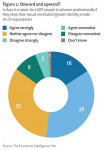CIO-CFO relationships stand the test of the economic crisis,according to the Economist Intelligence Unit
Such residual confidence is reflected in strong indications from many firms of continued improvement of CIO-CFO relationships. The latter might have been expected to suffer with budgets coming under severe pressure, but nearly one-half of respondents to an Economist Intelligence Unit survey report that co-ordination between the two executives has improved at their firms in the past year. Most CIOs and CFOs in the survey rate levels of trust, communication and understanding between themselves as strong. CFOs offer a rosier picture than do CIOs, but few in either group report any deterioration in their relationships.
CIOs also appear to be retaining their hard-won place at the senior decision-making table. Where they have gained a voice in major business and technology decisions, CIOs' positions are not being undermined as a result of the current economic crisis. Few survey respondents believe that the CIO's influence in technology investment decisions will decline in their firm, while a large minority expect CIO involvement in business strategy discussions to expand.
These findings, highlighted in a new report from the Economist Intelligence Unit, Staying the course? Technology decision-making in turbulent times, suggest that business leaders are looking to technology as in important instrument to prepare their firms for recovery. Other findings of the study, which was sponsored by SAP BusinessObjects, include the following:
Opportunistic firms are receptive to renewed technology investment. A large minority (44%) of the firms surveyed say that they will be "on the business offensive" in the coming year, looking for acquisitions or openings to take market share from weakened rivals. These firms are more likely than those adopting a "defensive" stance to consider selective new investment in technology. Investment proposals will not enjoy an easy ride, however. More executives are now involved in the approvals process, and the volume and detail of information required is increasing. Higher rates of return are demanded, and projects with shorter return periods are being favoured.
Most firms are averse to suspending existing technology projects. Less than one-quarter of survey participants believe that major existing technology-led projects should be suspended until business conditions improve. Indeed, many believe the crisis presents a good opportunity to drive through such initiatives. Few executives, however, even at growth-oriented firms, believe that now is a good time to launch entirely new IT projects. CFOs themselves support the continuance of major existing projects, but it is unclear how often spending requests in such areas will stand up to competing investment priorities in the business.
The focus of investment continues to be on improving customer relationships. Customer service will remain the priority area for IT investments during the coming year. This is for good reason, as evidence mounts from several sectors that customer loyalty is eroding and customer churn increasing. Information management will also be high on the priority list, especially when it comes to projects designed to improve firms' understanding of customer behaviour.
"Most firms will remain cautious about new technology investment until economic recovery looks more certain," affirms Denis McCauley, Director, Global Technology Research with the Economist Intelligence Unit. "But some firms will take risks with projects that help position them for growth when conditions improve. This raises the stakes for CIOs and the IT function, and they will need to deliver."
"A volatile mix of the global economic crisis, new business risks, empowered stakeholders, and an increased need for transparency and accountability have created a 'new reality' in business," says Jonathan Becher, Senior Vice President of Enterprise Solution Marketing, SAP. "Organisations today require greater levels of insight and visibility into their business. They must be able to easily extract information and gain insights from across their entire business network and use that information to take swift action—helping them to thrive in the current climate and become stronger and smarter competitors."
Notes for editors
Staying the course? Technology decision-making in turbulent times is an Economist Intelligence Unit report, sponsored by SAP BusinessObjects. The research is based on an online survey of 267 executives conducted by the Economist Intelligence Unit in February and March 2009. Forty-five percent of the survey sample were C-level executives, and over one-half of these were CIOs and CFOs. The respondents represented a broad range of company sizes and industries, although over half of participants hailed from the technology, financial services, consumer goods and retail sectors. The survey was also global, with one-third of respondents based in Europe and one-quarter from each of Asia-Pacific and North America. To supplement the survey results, the Economist Intelligence Unit also conducted interviews with senior executives and independent experts.
About the Economist Intelligence Unit
The Economist Intelligence Unit is the business information arm of The Economist Group, publisher of The Economist. Through our global network of about 650 analysts, we continuously assess and forecast political, economic and business conditions in 200 countries. As the world's leading provider of country intelligence, we help executives make better business decisions by providing timely, reliable and impartial analysis on worldwide market trends and business strategies.
웹사이트: http://www.eiu.com
연락처
Joanne McKenna, Press Liaison
+44 (0)20 7576 8188
이메일 보내기
이 보도자료는 Economist Intelligence Unit가(이) 작성해 뉴스와이어 서비스를 통해 배포한 뉴스입니다. 뉴스와이어는 편집 가이드라인을 준수합니다.




